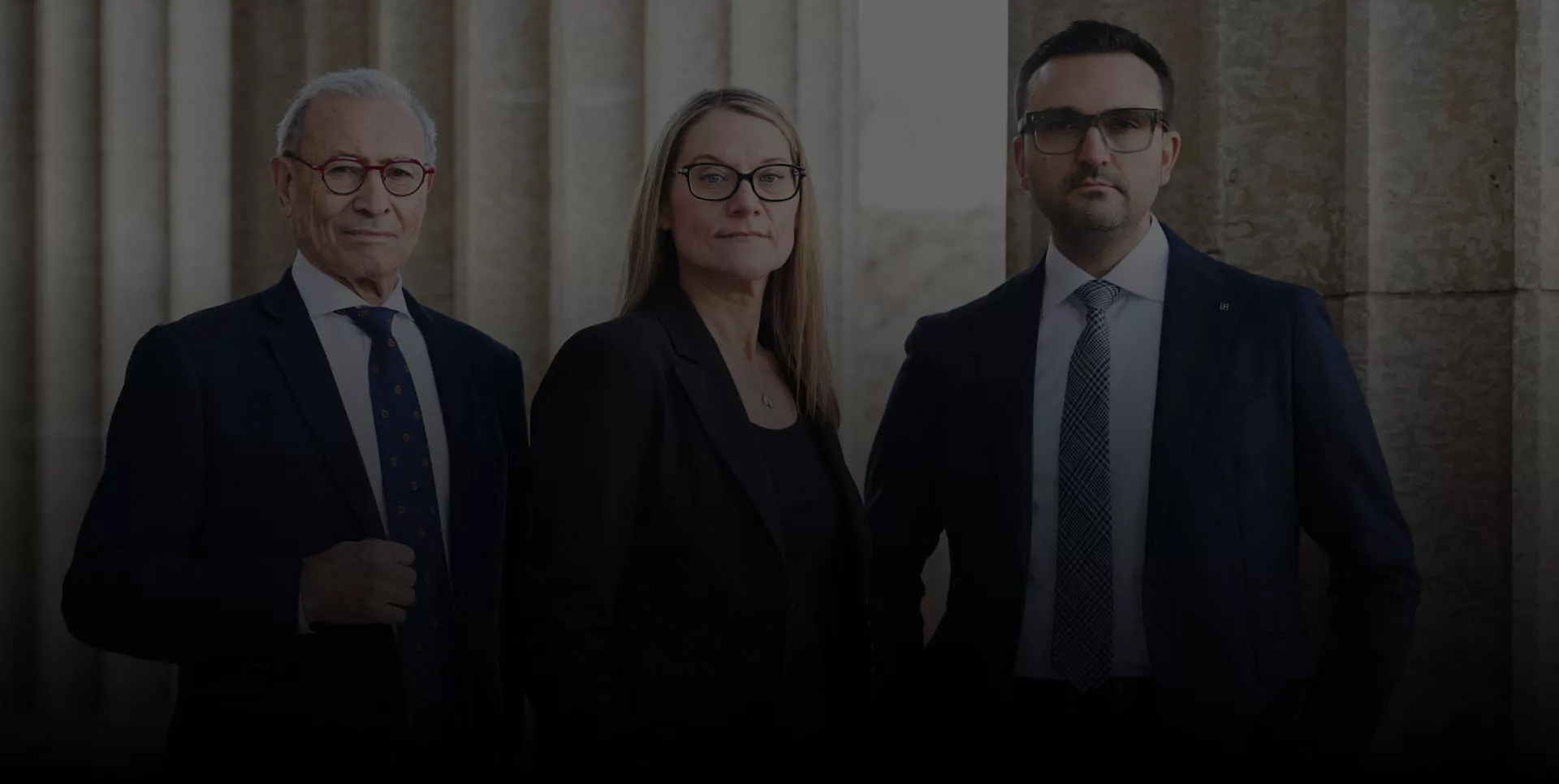Winnipeg Criminal Defence Lawyer
As an experienced Winnipeg criminal lawyer, I have conducted of hundreds of criminal cases. I leverage my legal knowledge and experience to fight aggressively to defend your rights and freedom.
Honesty and transparency
Empathy, careful listening and understanding
Communication and timely responses
Aggressive defence of your rights
Speak to Us First
Request a FREE case evaluation
100% Confidential
No Obligation

Experienced Winnipeg Criminal Lawyer
Called to the Manitoba Bar in 2004, I have been practicing criminal law for nearly 20 years. I have represented clients charged with offences ranging from Impaired Driving to First Degree Murder. I have also conducted trials and appeals in all levels of Manitoba courts as well as the Supreme Court of Canada.
As an experienced criminal lawyer in Winnipeg, I understand the intricacies of criminal charges and court proceedings. I also understand the impact that criminal charges can have on an individual’s life, reputation, and mental health.
When you work with me, you can expect the highest level of professionalism, concern, and communication. You can also rest assured that I will aggressively investigate all viable legal and technical arguments to defend your case and work hard to achieve the best possible outcome.

Commonly Asked Questions
Criminal Law & Legal Practice Areas
Assault Offences
Drug Offences
Sexual Offences
Weapons Offences
Driving Offences
Young Offenders
Property Offences
Bail Hearings
Murder
Other Legal Services
All Charges I Defend Against
Assault
Domestic Assault
Domestic assault involves an act of assault within a familial or intimate relationship setting. This type of assault includes physical, emotional, or psychological harm inflicted by a family member, partner, or close acquaintance. It spans offenses like simple to aggravated assault, sexual abuse, and in more severe cases, serious bodily harm or even death.
Sexual Assault
Sexual assault refers to any non-consensual sexual activity forced upon another person. This charge isn’t limited to physical contact; it also includes instances where there is a threat of sexual assault. The severity of these cases can vary, ranging from unwanted touching to violent attacks.
Driving Over 80
It is a criminal offence to operate a motor vehicle with a blood alcohol concentration that is equal to or exceeds 80 mg of alcohol in 100 mL of blood, even if you are not showing any signs of impairment. The Criminal Code allows the Crown Prosecutor to enter a Certificate of Analysis as proof of the blood alcohol content, and contains several presumptions that allow the Crown to prove its case more expeditiously.
DUI / DWI
In Manitoba, Driving Over 80 offences can be prosecuted under either the Criminal Code of Canada or the Manitoba Highway Traffic Act. The discretion as to how to prosecute the offence lies initially with the police, and then later on with the Crown. The consequences, while significant in either instance, are less severe under the Highway Traffic Act compared to facing criminal charges under the criminal justice system.
Impaired Driving
To be convicted of Impaired Driving, the Crown Prosecutor must prove that the Accused’s ability to operate a motor vehicle, at the time of driving, was impaired by alcohol, drugs, or a combination of the two. The degree of impairment does not have to be significant, even evidence of slight impairment will suffice. Proof of alcohol consumption alone, however, is not sufficient for a conviction.
Refusing a Breath Sample
A Peace Officer is entitled to ask you to provide a breath sample into an Approved Screening Device without any suspicion that you have consumed any alcohol. In this scenario, where a routine safety check is being completed, a driver is not entitled to contact counsel prior to providing the sample. Refusing to provide a breath sample, or failing to provide an adequate sample without reasonable excuse is a criminal offence that carries the same disruptive penalties as a conviction for Impaired Driving.
Dangerous Driving
Dangerous Driving refers to the operation of a motor vehicle in a manner that constitutes a marked departure from the standard of care that a reasonable person would observe in the driver’s situation. This can include, but is not limited to actions such as excessive speeding, aggressive driving behaviour, ignoring traffic signals, or texting while driving. A conviction for this offence, especially in situations where someone has been injured, can result in significant consequences.
Failure to Stop
The offence of Failing to Stop occurs when a driver is being pursued by a law enforcement officer who is also operating a motor vehicle. If the driver does not stop their vehicle, without a reasonable excuse, and in order to evade the police, they have committed an offence. Failure to Stop is considered a serious offence that can potentially result in imprisonment.
Drug Offences
The most common types of drug offences include possession for the purpose of trafficking, drug trafficking, drug production, and importing drugs. Depending on the nature of the drug, possession of even a small quantity of drugs for the purpose of trafficking can result in lengthy sentences of incarceration.
Break and Enter
Break and Enter involves unlawfully entering a premise, typically a dwelling or place of business, with an intent to commit an indictable offence therein. It applies regardless of whether force is used to gain entry in the context of the criminal justice system. The offense covers any instance where the individual breaches a location without permission or lawful justification, generally with the purpose of theft, vandalism, or other illicit activities occurring within that property.
Robbery
Robbery is the act of stealing something from someone using violence or the threat of violence. The severity of the punishment for robbery depends on the circumstances of the offence, and are particularly severe if a weapon (particularly a firearm is used in the commission of the offence) or if the offence is committed for the benefit of, at the direction of, or in association with a criminal organization.
Theft
Theft encompasses criminal offences involving the unauthorized taking or appropriation of another person’s property with the intention to deprive them of it. The charges vary based on several factors, including the value of the stolen property and the method by which the theft was carried out. Theft can range from minor instances such as shoplifting to more significant situations involving large sums of money, such as embezzlement from employers or other breaches of trust.
Credit Card Offences
The Criminal Code prohibits the theft, forgery, possession, use, or trafficking of credit cards or forged/falsified credit cards. The person committing such acts must know that the credit card was obtained, made, or altered either by committing an offence in Canada or by an act or omission that would constitute an offence if it occurred in Canada. The penalties for such offences are often severe.
Fraud
Fraud involves the use of dishonest or deceitful conduct to obtain some unjust advantage. It typically includes acts such as misrepresentation of facts, concealment of truth, or abuse of a position of trust. The offenses can vary greatly in their nature and complexity, ranging from simple scams to sophisticated schemes involving complex financial transactions. Fraud charges are applicable in situations where an individual or entity intentionally deceives another to cause a loss of property, money, or service, or to gain a personal or financial advantage.
Possession of Goods Obtained by Crime
Possession of Goods Obtained by Crime involves the unauthorized possession of goods or assets known, or believed, to have been obtained unlawfully. The charges apply regardless of whether the individual in possession was involved in the original theft or not. It encompasses situations where an individual knowingly holds, uses, or disposes of property that is stolen, embezzled, defrauded, or otherwise illicitly acquired.
Identity Theft
Identity Theft involves criminal offenses wherein an individual’s personal or financial information is unlawfully acquired and used without their consent, typically for fraudulent purposes. This could entail the use of names, social security numbers, bank account details, credit card information, or other identifying data to commit various forms of fraud or deception. The charges apply when such personal data is deliberately stolen and misused for activities like accessing financial resources, obtaining goods or services, evading law enforcement, or manipulating identities for illicit gains.
Murder and Manslaughter
Murder and manslaughter are severe criminal offenses involving the unlawful killing of another person. First Degree Murder charges apply when the act is intentional and premeditated, where Second Degree Murder Murder charges apply when a person intentionally cause the death of someone or intentionally inflicts bodily harm that they know is likely to cause death and is reckless as to whether death ensues. Manslaughter, on the other hand, involves unlawful killing without intent to kill, and often arises from reckless conduct or a criminal act that results in death, even if the death was not intended.
Appeals
If a person is convicted of an offence and disagrees with the conviction or sentence, they can appeal either or both. In an appeal, the onus is on the Appellant to prove that an error occurred in their trial and/or sentencing hearing which materially impacted the outcome. A successful conviction appeal normally results in a new trial being ordered, where a successful sentence appeal results in the appeal court imposing the appropriate sentence.
Bail Hearings
During a Bail Hearing a judge or justice of the peace determines whether an accused person should be released from custody pending their trial. The Judge considers the nature and severity of the alleged offense(s), the evidence against the accused, the accused’s criminal history, their likelihood to attend future court dates, and the impact of their release or detention on the administration of justice. When accused persons are granted bail, they are often required to abide by conditions to ensure the safety of the community and prevent any further offending behaviour.
Why Choose Gerri Wiebe as Your Criminal Defence Lawyer
I am an experienced and respected criminal defence lawyer with extensive experience in criminal defence law, and a proven track record of success in all levels of court in Manitoba. I take pride in my work, and treat each of my clients the way that I expect to be treated by service providers.
Wiebe Criminal Defence was named “Best Criminal Lawyer Winnipeg” and Best Criminal Defence Lawyers in Winnipeg.
Preparation and Communication
Careful and detailed preparation is the cornerstone of a strong defence. I gather information, review court documents, and listen intently to your side of the story. I also strive to communicate clearly and in a timely manner so you understand what is happening at all stages of the process.
Commitment to Your Case
I handle your case with the respect, seriousness, and dedication that it deserves. I am passionate about defending my clients and will explore every legal option to ensure the best outcome possible for each and every client.
Formulating a Solid Defence
I leverage my nearly 20 years of experience defending criminal charges and navigating the legal system to get the best possible outcome for you.
How I Can Help
How to Secure Your Defence
Wiebe Criminal Defence | Winnipeg Criminal Lawyer
Located in Winnipeg at 386 Broadway, in the heart of downtown, our criminal law firm offers legal representation to all of Winnipeg as well as the suburbs and rural areas surrounding Winnipeg.
Memberships and Associations
Called to the Bar June 17th, 2004
Called to the Bar June 17th, 2004
Called to the Bar June 17th, 2004
Called to the Bar June 17th, 2004
Called to the Bar June 17th, 2004
Winnipeg Service Areas
East Saint Paul
Omand's Creek
Westwood
Waverley West
Transcona
Industrial
Saint Boniface
Fort Richmond
North Pointe
Bronx
Grant Park
Prairie Grove
The Maples
St. James
Southdale
Oak Bluff
Tyndall Park
Lakewood
Linden Woods
St. Norbert
Garden City
Crestview
St. Vital Centre
Grande Pointe
Criminal Lawyer FAQs
What happens during a consultation with a criminal lawyer?
During a consultation with me as your criminal lawyer, I dedicate our time to fully understanding the details and circumstances surrounding your case. It’s an opportunity for you to share your account of events, concerns, and any specific queries you might have.
I will ask critical questions to gain a comprehensive overview of your situation, allowing me to assess the strengths and potential challenges of your case. This process also helps me gather information needed to develop effective legal strategies tailored for your circumstances.
We will discuss the legal procedures likely to be encountered, possible outcomes, and the costs involved in retaining my services. We’ll also review the retainer agreement together, ensuring you thoroughly understand the terms before committing to legal representation.
This consultation serves as a foundation for building our client-lawyer relationship based on trust, transparency, and mutual understanding.
Can I win my case?
Navigating criminal charges can be an overwhelming process. However, it’s essential to define what winning means for your specific case. Could it be a stay of proceedings? An acquittal? Or perhaps avoiding jail time? I am committed to providing comprehensive advice and handling your case with absolute diligence to secure the best possible outcome.
Will I go to jail?
In virtually any criminal charge scenario, incarceration is a possibility. Incarceration is, however, to be used as the last resort in sanctions, with judges mandated to explore all alternative forms of punishment before sentencing an accused to imprisonment. I can provide counsel on the likelihood of prison in your specific case.
Several factors influence potential sentencing, including possible jail time. These factors comprise the severity of the charges and the specific details of allegations, any lasting physical, financial or emotional impact on the victim(s), your past criminal record (particularly for similar offenses), previous jail sentences, the necessity for denunciation and/or deterrence, your rehabilitation prospects, and community support.
I understand the profound effect a prison sentence can have on an individual’s life. My focus is to deliver vigorous legal defense for my clients to prevent this outcome at all costs. I am honoured to be trusted by individuals faced with complex criminal charges and invite you to reach out today to discuss how I can assist you.
How can a criminal lawyer help with bail?
As a criminal lawyer, I can provide significant assistance in bail matters. Firstly, I guide you through the bail hearing process and work on preparing a strong case for your release. This involves gathering crucial evidence, locating suitable sureties if necessary, and formulating persuasive arguments that outline why releasing you would not pose a risk to public safety or lead to any failure to attend future court dates.
Furthermore, I can negotiate with the Crown Attorney to reach a consent release, if possible. In cases where bail conditions might otherwise be strict or challenging to meet, I can advocate for more reasonable terms that consider your personal circumstances.
Understanding that securing bail is a crucial step in maintaining one’s employment, meeting family responsibilities, and maintaining mental health during the legal process, I dedicate my expertise towards achieving this essential objective, with the aim of ensuring that your quality of life is maintained as much as possible while navigating your criminal charges.
How much does a criminal lawyer cost?
Criminal lawyers in Winnipeg have varying payment structures; some bill by the hour, while others utilize block fees. Hourly charges account for every minute dedicated to your case—this includes travel time, phone calls, court appearances, and more. Given the meticulous preparation required for Canadian criminal law files, these accumulated minutes can add up.
Alternatively, lawyers who operate on a block fee basis will inform you upfront of the total cost for your case. This method covers all services rendered by the lawyer, though additional disbursements such as photocopies, mileage, and process servers are usually billed separately, irrespective of whether the lawyer charges hourly or via block fees.
In most criminal cases, block fees tend to be the norm due to their predictability. From my experience, my clients prefer the block fees payment structure. It allows us to focus on delivering a thorough legal defense without needing to account for every minute spent working on their case.
